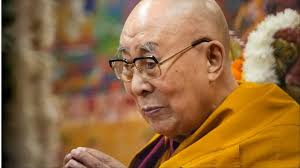China protests Modi’s birthday greetings for Dalai Lama

In a fresh diplomatic flare-up, China has strongly protested Indian Prime Minister Narendra Modi’s public birthday greetings to the Tibetan spiritual leader, the Dalai Lama, who turned 90 on July 6, 2025. The move has triggered a sharp reaction from Beijing, which considers the Dalai Lama a “separatist” and has long opposed any official engagement with him.
The greeting, which Modi posted on social media, read:
“I join 1.4 billion Indians in extending our warmest wishes to His Holiness the Dalai Lama on his 90th birthday. His enduring message of compassion, peace, and harmony continues to inspire humanity.”
Beijing’s Strong Objection
Reacting swiftly, the Chinese Foreign Ministry accused India of violating its commitments on Tibet and interfering in China’s internal affairs. At a press briefing in Beijing, spokesperson Mao Ning stated:
“The Indian side needs to understand that Tibet-related issues are China’s internal affairs. No external force should meddle under any pretext.”
She further called on India to respect Beijing’s “sovereignty and territorial integrity” and avoid actions that may “disrupt the stability of bilateral relations.”
China also objected to Indian Union Minister Kiren Rijiju’s participation in the birthday event held in Dharamshala, Himachal Pradesh — the seat of the Tibetan government-in-exile.
India’s Measured Response
India, however, downplayed China’s reaction. A senior official from the Ministry of External Affairs (MEA) clarified that wishing the Dalai Lama on his birthday is a well-established practice and should not be interpreted as political interference.
An MEA spokesperson said:
“His Holiness the Dalai Lama is deeply revered in India, and it is customary for Indian leaders to greet him on his birthday. There is nothing unusual or political in this gesture.”
India also reiterated its position that it recognizes Tibet as part of China, as per past diplomatic agreements. However, it insists on maintaining its cultural and humanitarian ties with the Tibetan spiritual leader, who has lived in exile in India since 1959.
The Dalai Lama’s Continued Relevance
The birthday celebrations this year were especially significant as the Dalai Lama turned 90, a symbolic milestone for Tibetans and Buddhists across the world. In his birthday address, the Nobel Peace Prize laureate expressed gratitude for India’s support and reiterated his commitment to non-violence and religious harmony.
The Dalai Lama also touched on the sensitive issue of his reincarnation, stating once again that only the Gaden Phodrang Trust — not China — has the right to determine his successor. This statement is seen as a direct rebuff to Beijing’s efforts to control the religious leadership of Tibetan Buddhism.
Historical Context
Tensions over the Dalai Lama are not new in Sino-Indian relations. Since the Tibetan uprising of 1959, when the Dalai Lama fled to India, Beijing has viewed him with deep suspicion, accusing him of harboring separatist motives — an allegation the Dalai Lama has consistently denied.
India has hosted the Tibetan leader for over six decades, offering him asylum and allowing the Tibetan community to flourish in exile. While India has mostly tried to avoid provoking China, it has continued to engage with the Dalai Lama on religious and humanitarian grounds.
However, the issue becomes a flashpoint in bilateral relations whenever Indian leaders — especially top officials like Modi — make public acknowledgments of the Dalai Lama’s stature.
Bilateral Implications
This recent exchange comes at a time when India-China ties remain fragile following the 2020 Galwan Valley clashes and the ongoing border standoff in eastern Ladakh. Despite several rounds of military and diplomatic talks, troop disengagement remains partial, and mutual trust is at a low point.
Modi’s greetings — though symbolic — are likely to be interpreted in Beijing as part of a broader Indian strategy to assert its regional stance and push back against Chinese assertiveness. Analysts say it also reflects India’s subtle support for Tibetan cultural identity and religious freedom.
Global Attention and Support
International leaders and Tibetan rights activists have also sent their wishes to the Dalai Lama, further fueling China’s discomfort. Actor and activist Richard Gere, a longtime advocate for the Tibetan cause, reaffirmed his commitment to supporting Tibet’s cultural and religious autonomy.
The U.S. and European governments have frequently reiterated their support for Tibetan religious freedoms, though most stop short of recognizing the Tibetan government-in-exile.
Conclusion
The diplomatic friction over Prime Minister Modi’s birthday greetings to the Dalai Lama underlines the delicate and complex nature of India-China relations. While India maintains that the Dalai Lama is a spiritual figure and an honored guest, China continues to view any official gesture toward him as a political provocation.
As both nations navigate this sensitive terrain, the Dalai Lama’s 90th birthday has once again become a focal point in the broader contest of ideology, influence, and diplomacy between Asia’s two major powers.






